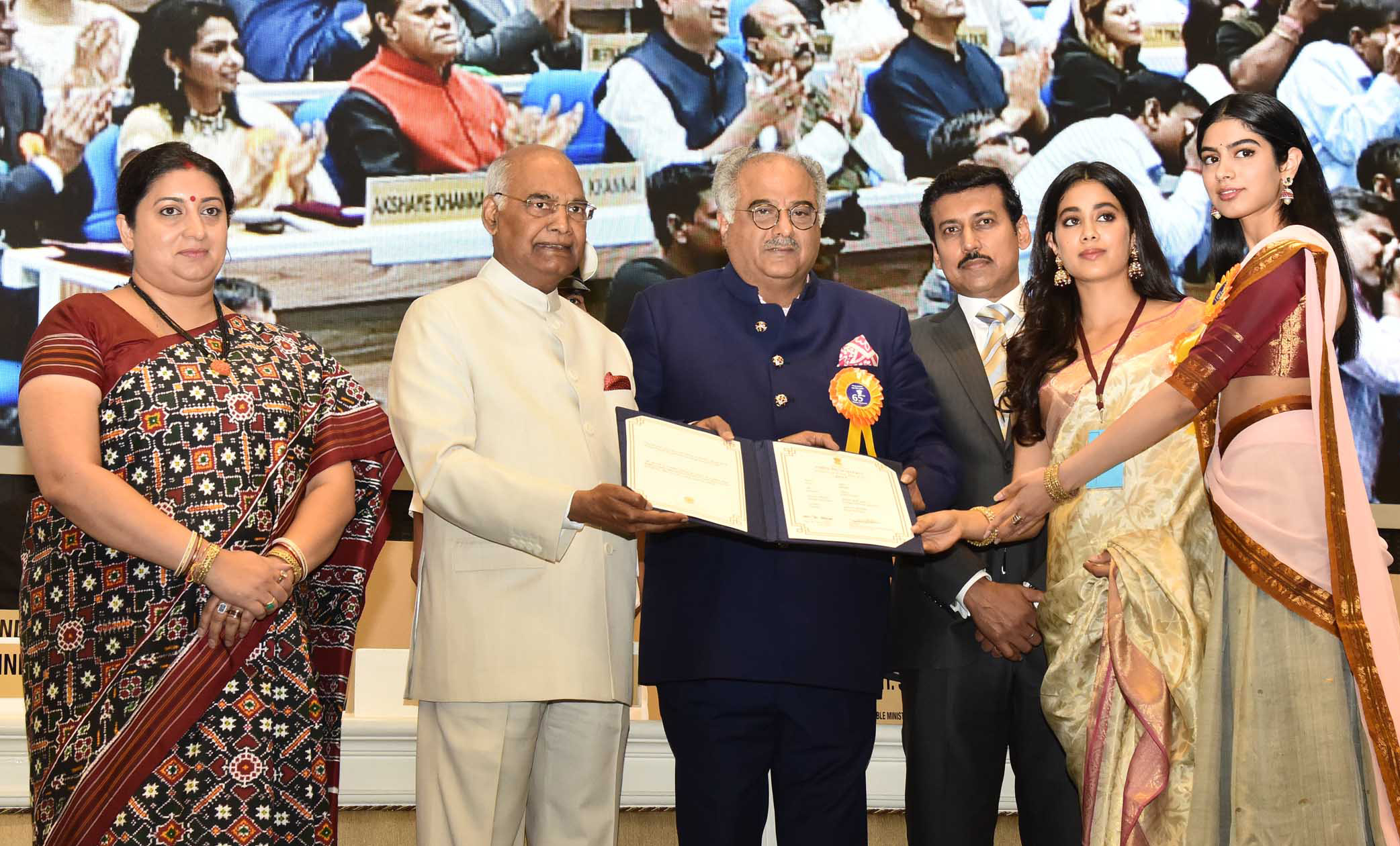Of sacrificial lambs and scapegoats
Ravi Shanker Kapoor | May 18, 2019 5:52 pm

The President, Shri Ram Nath Kovind presenting the Best Actress Award to Sridevi (posthumous), the award received by her husband Boney Kapoor and daughters Janhvi Kapoor & Khushi Kapoor, at the 65th National Film Awards Function, in New Delhi on May 03, 2018. The Union Minister for Textiles and Information & Broadcasting, Smt. Smriti Irani and the Minister of State for Youth Affairs and Sports (I/C) and Information & Broadcasting, Col. Rajyavardhan Singh Rathore are also seen.
Ever wondered why a goat is sacrificed? Well, you can’t sacrifice a lion, for he is capable of returning the compliment. Even the non-violent horse is too big to be handled; only kings of yore were capable of sacrificing horses—in Ashwamedha Yagya. The goat, however, is too small and timid to be troublesome. Hence the goat. And hence also the scapegoat, as we shall see. The religious practices have spilled over to other domains. The recent scapegoat is an Information & Broadcasting (I&B) Ministry official, reportedly held “fully responsible” for the 2018 National Film Awards mess.
The official is Chaitanya Prasad of the Indian Information Service (IIS). The news portal ThePrint reported on May 12, “In an internal note to I&B secretary Amit Khare, Ashok Parmar, joint secretary in the ministry, has held Prasad fully responsible, saying he was aware that President Kovind was to attend the ceremony for only an hour but didn’t convey this to the winners early.”
The film awards event, held on May 3 last year, hugely embarrassed the Narendra Modi government as many awardees boycotted it. The reason: they came to know at the last moment that President Ram Nath Kovind will not give away all the awards, most of which would be handed over by the then I&B minister Smriti Irani. Out of the 140 awardees, 56 boycotted the function.
While the note blames Prasad solely for the boycott, it is apparently silent on the root-cause of the scandal: President Kovind’s refusal to follow convention and set a new precedent. Instead of giving away all awards, he unilaterally decided that he would attend the function for only one hour.
The note mentions, though, that Rashtrapati Bhavan had informed the I&B Ministry about the President’s diktat: “Generally, the President has to stay for at least three hours to give away awards to around 140 awardees during the function. Shri Chaitanya Prasad did not intimate the awardees about the change in the schedule of the NFA function.”
This was confirmed to me by cinema expert and former senior Doordarshan official Sharad Datt, who was also involved in the organizing of film award functions. “Every president has followed this tradition, except Shankar Dayal Sharma, but that was because of a medical condition. But we found a way out.”
Last year, however, the government was not able to salvage the situation. Prasad has been holding the additional charges of the Directorate of Film Festivals (which also organizes film awards), Officer on Special Duty in the I&B Ministry, and of Additional Director General in Doordarshan News. The note has accused him of being rude with the awardees, having “provoked” them by his “arrogance and misbehavior.”
Whether or not the accusations are correct is beside the point and is of little important; what is of utmost importance is the incumbent President’s cavalier attitude and dreadful disregard for convention. A Rashtrapati Bhawan press note had said at that time: “President attends all award functions and convocations for a maximum of one hour. This has been the protocol since he took office. It was conveyed to I&B Ministry several weeks ago and the Ministry knew this all along. Rashtrapati Bhawan is surprised by the 11th hour questions that have been raised.” The operative part in this communiqué was “since he took office.”
At that time, I had spoken to Ashok Malik, Press Secretary to the President of India, as why his boss breached the 67-year-old tradition. “Since he became President, he has been following this protocol [of attending any function for one hour],” Malik said.
But can and should protocols change as per the whims and fancies of every incumbent President? Will every President have his or her own protocol? Should conventions be allowed to be breached in such a haughty fashion? Malik refused to answer these questions, saying that he didn’t want to enter into a debate.
A.V. Dicey, the legendary constitutional theorist, underlined the importance of convention in his stately work, Introduction to the Study of the Law of the Constitution (1883). According to him, constitutional law “consists of two elements. The one element, here called the ‘law of the constitution,’ is a body of undoubted law; the other element, here called the ‘conventions of the constitution,’ consists of maxims or practices which, though they regulate the ordinary conduct of the Crown, of Ministers, and of other persons under the constitution, are not in strictness laws at all.”
Dicey “regretted that these maxims must be called ‘conventional,’ for the word suggests a notion of insignificance or unreality. This, however, is the last idea which any teacher would wish to convey to his hearers. Of constitutional conventions or practices some are as important as any laws, though some may be trivial, as may also be the case with a genuine law.”
It is sad that in the world’s largest democracy, modeled on Britain’s, the head of the state is so casual and cavalier about protocols and conventions. To conceal this fact, the authorities decided to find a scapegoat.
A scapegoat, according to Encyclopedia Britannica, is a goat symbolically burdened with the sins of the Jewish people. “Some scholars believe that the animal was chosen by lot to placate Azazel, a wilderness demon, then thrown over a precipice outside Jerusalem to rid the nation of its iniquities. By extension, a scapegoat has come to mean any group or individual that innocently bears the blame of others.”
The I&B Ministry has found a scapegoat in Prasad, so that the head of the state remains without blemish.






























